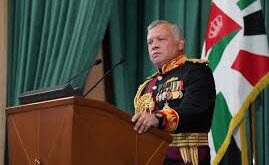Friday’s announcement that the CIA’s covert program to arm and back Syrian rebels is being shut down amounts to an official declaration that the US administration has abandoned both the political and armed wings of the Syrian opposition. That effectively means handing Syria, or most of it, to the Russians, deferring to Moscow’s policies and plans in the country, and accepting once and for all that President Bashar al-Asad and his government will remain in power, if only for a while.
For six years, the CIA has been training and arming Syrian factions in bases in Jordan and Turkey and inside Syria, supplying them with billions of dollars and tons of weapons and ammunition, but failed to achieve the declared aim of bringing down the Syrian regime.
This new decision is unsurprising given changing American policy priorities, the US-Russian understandings reached since the Trump administration came to power, the failure of the armed opposition to topple the regime, and the rise of extremist Islamist groups such as Islamic State/Daesh and Tahrir ash-Sham/Nusra which increasingly branded this opposition as ‘terrorist’ – just as the Syrian authorities have always described it.
Successive splits in the ranks of the ‘moderate’ opposition – or, rather, that part of it that is not designated as terrorist –reflect this US retreat. They also reflect its abandonment by Arab sponsors like Saudi Arabia and Qatar who are now busy with their own quarrel, the collapse of the Turkish project in Syria, and the countervailing rise of the US-backed Kurdish project.
On Thursday, the Noureddin Zengi Movement – the most powerful and prominent component of the Tahrir ash-Sham alliance (formerly the Nusra Front) — announced that and other groups were withdrawing from the coalition some six months after joining it. Its official justification was that this was due to its ruling council having taken decisions and issued statements without consulting most of its members, including its decision to wage war on the rival Ahrar ash-Sham jihadi group and shun mediation efforts.
The withdrawal of Noureddin Zengi, which has around 8,000 fighters, is a huge blow and may be the prelude to other splits amid intensified fighting between Tahrir ash-Sham/Nusra and Ahrar ash-Sham. The Jaysh al-Islam faction in the Eastern Ghouta district has also disbanded and merged with other groups.
There are several reasons why the Trump administration decided to ditch the Syrian opposition and leave it to its fate – just as the US did with with the Afghan mujahedeen, the South Vietnamese and the Sunni ‘Awakening’ Forces in Iraq.
First, the US began banking some time ago on the Kurdish fighters of the People’s Protection Units (YPG) and Syrian Democratic Forces (SDF) as its reliable new allies in Syria and the region.
Meanwhile, it has consolidated its own military presence in Syria, establishing ten military bases in northern Syria including airbases, and deploying aircraft, missiles and tanks.
Third, the conviction has gradually grown in the US and Europe that Asad’s regime cannot be toppled while the Russians remain in Syria, and that there is no viable alternative to it in any case. French President Emmanuel Macron recently pointed out that there was no legitimate successor to Asad, while US Secretary of State Rex Tillerson affirmed that it was for the Syrian people to decide his fate.
And finally, the Syrian opposition’s bankrollers in the Gulf are preoccupied with their internecine disagreements (Saudi Arabia and the UAE vs. Qatar), the war in Yemen, and ever-rising tensions with Iran.
The US tried to ride the wave of the Syrian people’s just demands for democracy and freedom and instructed the CIA and its Gulf allies to arm the Syrian opposition. This was aimed both at exacting revenge against the Syrian regime – as happened in Libya, Yemen, and Iraq – and destabilizing the country and the region by by drowning them in sectarian and ethnic wars under false guises. But with the failure (so far) of this scheme’s latest episode in Syria, it has opted to wash its hands of this opposition.
Everyone in the region who banks, or continues to bank, on the US and its allies – with the exception of Israel – ends up meeting with defeat, humiliation and a tragic end. It was only natural for the Syrian opposition to be no exception, not to mention the many other reasons for its difficulties.
Even the Israeli occupation state will end up facing the same fate in due course. It is only a matter of time. One need only note its current state of panic at the region-wide revival of the culture of resistance, the growing missile deterrent and threat it faces from Iran and Hezbollah, the waning power and influence of the so-called ‘moderate’ Arab camp, and the restoration of balance to global power-politics and weakening of US hegemony.
The price for this great deception, and for falling for the US-Gulf lie, was paid by the Syrian people – with their blood, loved ones, livelihoods and safety, and their country’s security and physical and communal cohesion. This does not mean their demands for freedom, justice, democracy, and equality were not legitimate. Indeed, they must continue the struggle to achieve these goals.
But that has little to do with the Gulf-sponsored offshore opposition based in
Riyadh or Istanbul. We will doubtless be seeing and hearing less of the Syrian Supreme Commission for Negotiations (SSCM) and the Syrian National Coalition (SNC), their leaders’ statements and shuttling to the Geneva conference, and even their disagreements, in the weeks and months to come. Indeed, it would not be surprising if their host-states were eventually to take the same road as the US, and cut them off completely.
Abdel Bari Atwan
 Geostrategic Media Political Commentary, Analysis, Security, Defense
Geostrategic Media Political Commentary, Analysis, Security, Defense





